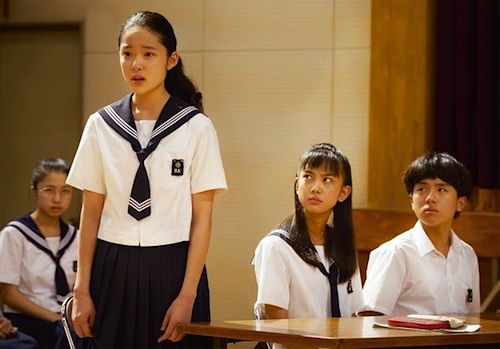By Joe Bendel. Even in middle school, the cover-up is almost as bad as the crime. One fateful morning, Ryoko Fujino discovered a classmate’s body lying dead in the snow. The police and the school declared it a suicide and that was that, until someone started sending anonymous letters accusing the school bully of murder. The grown-ups in authority will try to paper over it again, but Fujino and her classmates will have none of it. They are determined to reveal the truth, even though they have no lofty hopes that it will set them free in Izuru Narushima’s gripping two-part, four-and-a-half-hour-plus film sequence, Solomon’s Perjury Part 1: Suspicion and Solomon’s Perjury Part 2: Judgement, which both screen as part of the 2015 New York Asian Film Festival.
On the Christmas morning in question, Fujino and a classmate trudge to Joto No. 3 Junior High School, to feed the rabbits. They are filling in for the recently absent Takuya Kashiwagi, whose body they are about to discover Fargo style. After a perfunctory investigation, the juvy division detective Reiko Sasaki concludes it was suicide and closes the case. However, a few weeks later, Fujino gets a mysterious missive claiming the thuggish Shunji Oide murdered Kashiwagi and imploring her to have her police detective father reopen the case.
Fujino is not the only person to receive such a J’accuse. Copies were also sent to the principal and Kashiwagi’s home room teacher, but the fate of the latter will become a source of great contention too complicated to explain here. Much to the frustration of the two bullied letter-writers, the police seem more concerned with ferreting out the accusers than investigating the accusations.
Of course, no matter how hard the authorities try to keep a lid on the affair, word still leaks out to the student body—and the effect is poisonous. When the ensuing paranoia leads to the death of one of the not so anonymous letter-writing girls, student outrage reaches critical mass. Resolved to discover the truth, Fujino and her friends will stage their own trial of Oide, complete with a student jury, in a deliberate departure from Japanese jurisprudence. To fairly represent the defendant, they enlist Kazuhiko Kanbara, a former primary school acquaintance of Kashiwagi, who clearly has his own murky agenda.
Without question, Solomon’s Perjury is the event of this year’s NYAFF. It starts out as a twisty turny mystery and mushrooms into a moral treatise on the nature of guilt and responsibility. In many ways, it delivers an emotional walloping similar to the original first season Broadchurch, but in contrast, it leaves the audience with a feeling of empowerment. In film terms, think of it as something like one part Tetsuya Nakashima’s Confessions and two parts Edward Yang’s Brighter Summer Day, but it has its own distinct tone.
Wisely, screenwriter Manabe Katsuiko retains the tail-end of the 1990 bubble economy setting of Miyabe Miyuki’s source novel, which is a blessing in several ways. While the perceptive kids’ jaded opinions of their ethically compromised parents retains all its bite, the lack of semi-literate text messages cluttering up the screen is a welcome relief. In fact, the existence of phone booths, now practically extinct, plays a critical role in V. 2.

The writing is smart and scrupulously realistic throughout both installments, but the way the young ensemble breathes life into the narrative is truly remarkable. If you want to see youthful actors putting on a clinic, this is your ticket. Up and down the line, they put the Harry Potter franchise to shame, led by the extraordinary Ryoko Fujino, who adopted her character’s name as her professional nom-de-guerre. Words like poise, nuance, and vulnerability do not do her justice.
Still, she does not do it alone. In particular, Mizuki Itagaki, Miu Tomita, and Haru Kuroki have moments of quiet devastation as the mysterious friend, the ill-fated accuser, and the harassed home room teacher. For the sake of our souls, Yutaka Matsushige also nicely lays down some crusty comic relief as the cooler-than-he-looks gym teacher, Kitao.
Even though it was released as separate installments in Japan it would be preferable to see Solomon’s Perjury as a complete package. Be that as it may, NYAFF is showing it over two nights, but it is worth the inconvenience and extra admission. It grabs the audience right from the start and pulls them in deeper with each revelation. Yet, it might be even more exciting to witness the arrival of so much new talent. Very highly recommended, Solomon’s Perjury Part 1 screens this Sunday (7/5) at the Walter Reade and Part 2 screens on Friday the 10th at the SVA, as part of this year’s NYAFF.
LFM GRADE: A
Posted on July 3rd, 2015 at 12:53am.